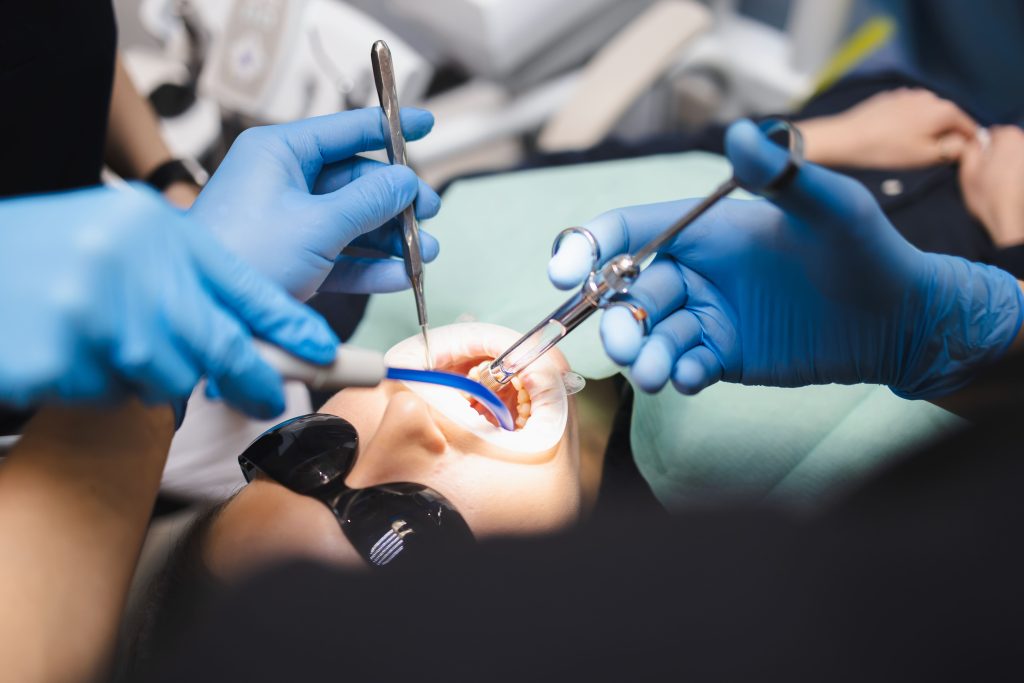Home » What is Oral Surgery ?
What is Oral Surgery ?
Oral surgery is a specialised branch of dentistry that focuses on the diagnosis and treatment of conditions that affect the mouth, teeth, and jaw. From extractions to implants, surgery can help restore dental health and provide relief from pain and discomfort. Read on to learn more about the different types of oral surgery and when it may be necessary.
Types of Oral Surgery
When it comes to oral health, surgery is sometimes necessary. You may be considering surgery if you need to have a wisdom tooth removed, have a dental implant placed, need corrective jaw surgery, or require periodontal surgery. Before you proceed, it’s important to understand the different types of oral surgery and the benefits and risks associated with each.
Wisdom Tooth Extraction
If your wisdom teeth are causing crowding, coming in at funny angles, or causing pain, your dentist or oral surgeon may recommend wisdom tooth extraction. This procedure is usually done under local anaesthesia and can help to prevent future dental issues.
Dental Implants
Dental implants are a great choice for those who want to replace missing teeth. This procedure involves surgically placing a titanium post into your jawbone and then attaching a crown or bridge to the post. Dental implants are a permanent solution and can help improve your smile.
Corrective Jaw Surgery
Corrective jaw surgery, also known as orthognathic surgery, is used to correct misalignment of the jaw and teeth. This procedure can help improve your facial appearance and make it easier to chew, speak, and breathe.
Periodontal Surgery
Periodontal surgery is used to treat gum disease and can help to restore the health of your gum tissue. This surgery can be used to remove infection, reduce pocket depths, and reshape the gum tissue.

When Is Oral Surgery Necessary?
Oral surgery is an important and helpful tool in restoring your oral health. But when is it necessary? Here are the most common reasons your dentist may suggest surgery:
- Tooth decay or damage
Oral surgery can help repair teeth that are broken, chipped, or decayed.
- Jaw misalignment
If your jaw is not properly aligned, surgery can help restore it to its natural position.
- Infection
If you have an infection in your mouth, surgery can help remove it.
- Impacted wisdom teeth
Wisdom teeth can become impacted, or stuck in the jawbone, and may require surgery to remove them.
- Facial deformities
Oral surgery can help correct facial deformities or asymmetries.
- Alignment of teeth and jaw
If your teeth and jaw are not properly aligned, oral surgery can help correct this.
Surgery is often a last resort, but it can be a very effective way to restore your oral health. If you think you may need surgery, be sure to talk to your dentist about your options.
The Benefits of Oral Surgery
Oral surgery can help restore dental health, improve the appearance of the teeth and mouth, and reduce pain and discomfort. It can also help prevent further damage or infection and improve the overall quality of life.
Risks of Oral Surgery
Like with any medical procedure, there are some risks associated with surgery. These can include pain, swelling, infection, and nerve damage. It’s important to discuss these risks with your dentist or oral surgeon before proceeding.
Oral surgery is a specialised type of dentistry that can help restore dental health and provide relief from pain and discomfort. There are several types of oral surgery, and they are usually recommended when other treatments are not effective. While there are some risks associated with surgery, the benefits can be significant. If you’re considering oral surgery, speak with your dentist or oral surgeon to discuss your options.






